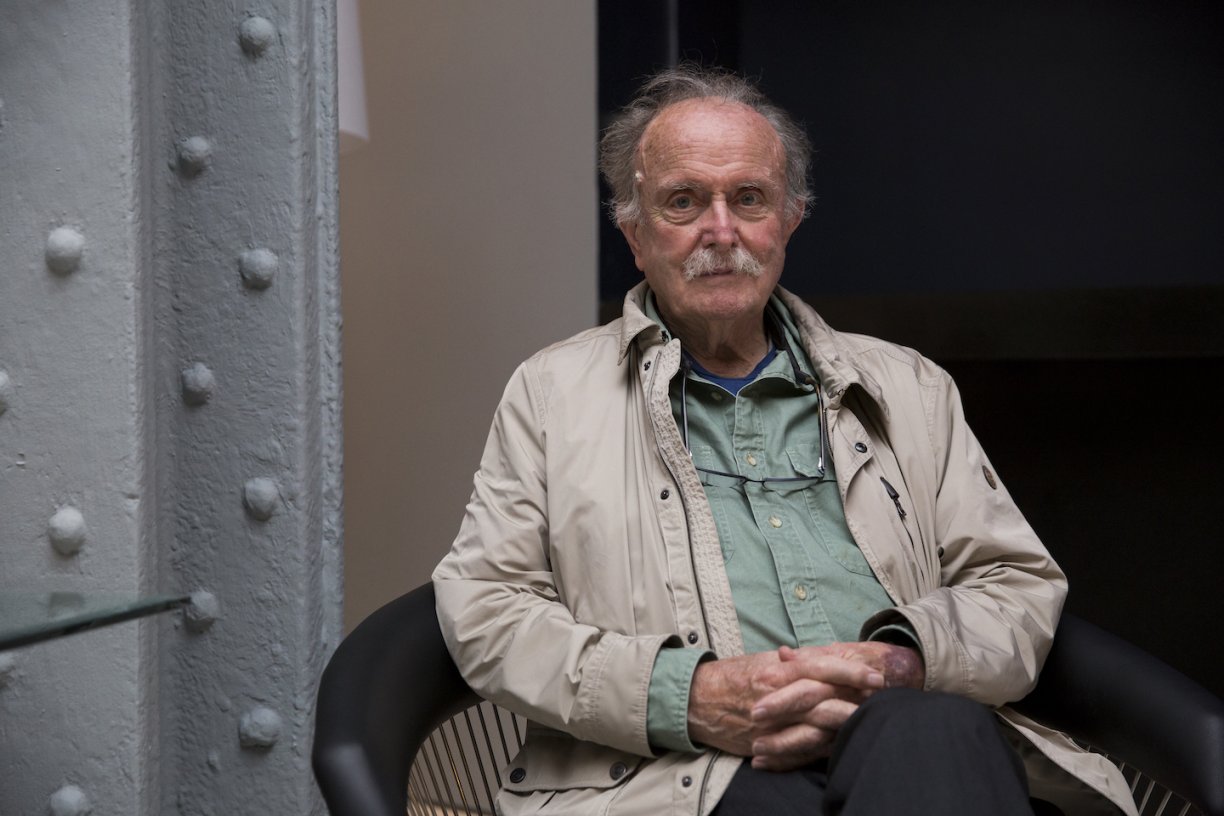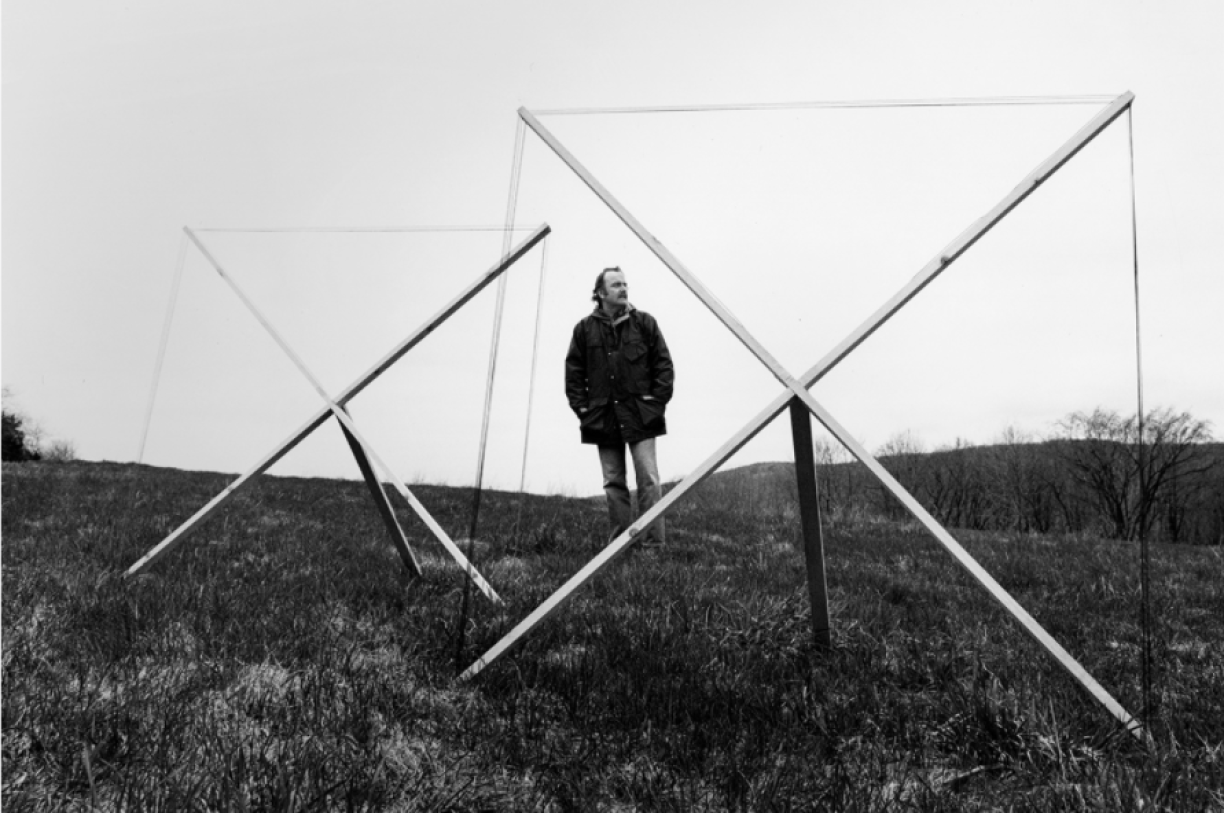Thursday, November 9th, ISSUE presents the second evening of a two day series observing the work of revolutionist American composer Alvin Lucier in partnership with Zürcher Hochschule der Kunste in Zurich, Switzerland (ZHDK). The occasion intersects both Lucier’s resonant history with ISSUE as well as ZHDK’s recent festival that celebrated Lucier’s 85th birthday.
Held in October of 2016, ZHDK’s festivities were centered around three days of concerts, installations, workshops, and symposiums that featured Lucier and prominent figures such as Joan La Barbara, Charles Curtis, Stephen O’Malley, Oren Ambarchi, Gary Schmalzl, as well as many University students and faculty members spanning the disciplines of composition, music theory, musicology, sound studies, aesthetics, critical theory, and art history. ISSUE presents a crucial New York staging of the 2016 happenings, involving many of its participants, including Oren Ambarchi, Gary Schmalzl, and the University initiated Ever Present Orchestra, an ensemble dedicated to specifically performing Lucier’s work. The series also sees the publication of documents from the festival, including a box set that includes four LPs (12 “/ 180 gram), a CD, as well as a discursive publication of essays, interviews, scientific articles and archival photos edited by Bernhard Rietbrock. Lucier will conduct a signing session of the box set after the concert.
The November 9th program features a performance of Lucier’s 2013 piece Criss-Cross for two electric guitars, featuring celebrated guitarist, composer and multi-instrumentalist Oren Ambarchi and renowned German live and studio guitarist Gary Schmalzl. Originally premiered at Illan Volkov’s Tectonics Glasgow in May 2013, the piece was staged at ISSUE in 2014 by Stephen O’Malley & Oren Ambarchi on a program that featured works by Eyvind Kang, Iancu Dumitrescu and Giacinto Scelsi and performances by Crys Cole and Jessika Kenney. This marks a reprisal of Lucier’s first and only piece for electric guitar.
The Ever Present Orchestra, consisting of an ensemble of four guitarists (including Oren Ambarchi), three saxophonists, four violinists, and a pianist, also perform the New York premieres of 2012 piece Two Circles and Double Cross-Hatch, a piece written this year.
The evening concludes with Lucier himself staging his paradigmatic 1970 work I am sitting in a room. The piece consists of several sentences of recorded speech simultaneously played back into a room where they are re-recorded sequentially. As the repetitive sequence continues, those sounds and resonances common to the original spoken statement and those implied by the structural dimensions of the room are reinforced. The others are gradually eliminated. As the album notes for the Lovely Music edition of the piece state, “the space acts as a filter; the speech is transformed into pure sound [...] All the recorded segments are spliced together in the order in which they were made and constitute the work.” A fascinating exploration of acoustical phenomena, Alvin Lucier slips from the domain of language to that of music in the course of 40 minutes and 32 repetitions of a simple paragraph of text. Composer and former student of Alvin Lucier Nicolas Collins notes that “l am sitting in a room would seem to be a piece that needs no further explanation. It begins, after all, by stating in plain English exactly what is going to happen and why – a radical notion at the time (1969), and one that spawned a whole school of compositional activity in the United States and England.” He goes on, “Somehow, somewhere in the course of 40 minutes the meaning of what we've been listening to has slipped from the domain of language to that of harmony.”
The program observes Lucier’s delicate and lyrical compositional legacy and his enduring engagement with the elusive characteristics of how sound materializes -- with how acoustic mechanics are rediscovered, considered, and performed. Lucier has pioneered many areas of music composition and performance, including the notation of performers' physical gestures, the use of brain waves in live performance, the generation of visual imagery by sound in vibrating media, and the evocation of room acoustics for musical purposes. His sensitivity to sound as a physical phenomenon and his attention to rich aural experience is often practiced through tactical, research-oriented strategies dedicated to contextual listening. A vital figure within experimental music, the compositions of Lucier highlight a general theory of sound, one suggestive of our entangled perceptual position in the sonic world, as well as our attempts to hear the yet-to-be heard.
PROGRAM:
Alvin Lucier: Criss-Cross - Oren Ambarchi and Gary Schmalzl
Alvin Lucier: Two Circles - Ever Present Orchestra
Alvin Lucier: Double Cross-Hatch - Ever Present Orchestra
Intermission
Alvin Lucier: I am sitting in a room - Alvin Lucier
Since the mid-1960s, Alvin Lucier has produced a range of important compositions that have influenced the culture of experimental music and the sonic arts. Early works such as Music for Solo Performer (1965), Vespers (1968), I am sitting in a room (1970), and Bird and Person Dyning (1975) establish a clear thread throughout his long career. Lucier was born in 1931 in Nashua, New Hampshire. He was educated in Nashua public and parochial schools, the Portsmouth Abbey School, Yale, and Brandeis and spent two years in Rome on a Fulbright Scholarship. From 1962 to 1970 he taught at Brandeis, where he conducted the Brandeis University Chamber Chorus, which devoted much of its time to the performance of new music. In 1966, along with Robert Ashley, David Behrman and Gordon Mumma, he co-founded the Sonic Arts Union. From 1968 to 2011 he taught at Wesleyan University where he was John Spencer Camp Professor of Music.
Lucier lectures and performs extensively in Asia, Europe and The United States. He has collaborated with John Ashbury (Theme) and Robert Wilson (Skin, Meat, Bone). His sound installation, 6 Resonant Points Along a Curved Wall, accompanied Sol DeWitt’s enormous sculpture, Curved Wall, in Graz, Austria, and in the Zilkha Gallery, Wesleyan University in January 2005. Recent instrumental works include Coda Variations for 6-valve solo tuba; Twonings for cello and piano; Canon, commissioned by the Bang on a Can All-Stars, and Music with Missing Parts, a re-orchestration of Mozart’s Requiem, premiered at the Mozarteum, Salzburg in December 2007. In October 2012 Two Circles, a chamber work, commissioned by The Venice Biennale, was premiered there by the Alter Ego Ensemble and in December 2013 a new work, December 12th, was performed by the Ensemble Pamplemousse at ISSUE Project Room, Brooklyn and Firewood, performed in March 2014 by the Bang on a Can All Stars at Merkin Hall, New York. Lucier has recently completed two new chamber works: Orpheus Variations for solo cello and seven wind instruments and Hanover for violin, alto and tenor saxophones, piano, percussion and three banjos. In 2013 Mr. Lucier was the guest composer at the Tectonics Festival in Glasgow, the Ultima Festival, Oslo and gave a portrait concert at the Louvre, Paris, with cellist Charles Curtis. Recent events in 2014 include three evenings of Lucier’s works presented by the International Contemporary Ensemble, in Chicago; two concerts at Roulette, performed by the Callithumpian Consort, as well several concerts at The Tectonics Festival, Reykjavik, Iceland. In October 2014 Lucier was honored by a three-day festival of his works at the Stedelijk Museum, Amsterdam. Reflections/Reflexionen, a bi-lingual edition of Lucier's scores, interviews and writings was published by MusikTexte, Köln. In September 2012 the Wesleyan Press published Lucier's latest book, Music 109: Notes on Experimental Music. In 2013 New World Records released a recording of three of Lucier's orchestra works. Alvin Lucier was awarded the Lifetime Achievement Award by the Society for Electro-Acoustic Music in the United States and received an Honorary Doctorate of Arts from the University of Plymouth, England.
Oren Ambarchi's works are hesitant and tense extended songforms located in the cracks between several schools: modern electronics and processing; laminal improvisation and minimalism; hushed, pensive songwriting; the deceptive simplicity and temporal suspensions of composers such as Morton Feldman and Alvin Lucier; and the physicality of rock music, slowed down and stripped back to its bare bones, abstracted and replaced with pure signal. From the late 90's his experiments in guitar abstraction and extended technique have led to a more personal and unique sound-world incorporating a broader palette of instruments and sensibilities. On releases such as Grapes From The Estate and In The Pendulum's Embrace Ambarchi employed glass harmonica, strings, bells, piano, drums and percussion, creating fragile textures as light as air which tenuously coexist with the deep, wall-shaking bass tones derived from his guitar.
Ambarchi has performed and recorded with a diverse array of artists such as Fennesz, Charlemagne Palestine, Sunn 0)), Thomas Brinkmann, Keiji Haino, Alvin Lucier, John Zorn, Merzbow, Jim O'Rourke, Keith Rowe, Akio Suzuki, Phill Niblock, John Tilbury, Richard Pinhas, Evan Parker, crys cole, Fire! and many more. Since 2001 Ambarchi has toured Europe, North America and Japan regularly and has performed at major festivals such as ATP (UK), Sonar (Spain), Mutek (Canada), CTM (Germany), INA GRM (France), Roskilde (Denmark), Etna Fest (Italy), Festival De Mexico (Mexico) and many more including a recent live collaboration with the Icelandic Symphony Orchestra at the Tectonics festival in Reykjavik. His acclaimed trio with Keiji Haino and Jim O'Rourke performs in Tokyo annually with many of their concerts documented on Ambarchi's Black Truffle label. Ambarchi has released numerous recordings for labels such as Touch, Southern Lord, Editions Mego, Drag City, Kranky and Tzadik.
The Ever Present Orchestra is dedicated to the presentation of the exceptional work of the American composer Alvin Lucier. The orchestra attempts to make Lucier’s beating-pattern-focused instrumental music approachable to a wide audience with its uncommon instrumentation of 4 electric guitars, 3 saxophones, 4 violins, and a piano. Along with classical musicians, the presence of prominent Lucier interpreters such as experimental guitarist Oren Ambarchi and Stephen O’Malley from Sunn O))), allows for the ensemble to appeal to a wider audience than the conventional contemporary music scene. The Orchestra was founded by Bernhard Rietbrock after the 85th Birthday Festival of Alvin Lucier at the Zurich University of the Arts, as a part of the Swiss National Research Council project Reflexive Experimental Aesthetics after Alvin Lucier (Reflexive Experimentalästhetik nach Alvin Lucier). Its unusual instrumentation came about as a result of the presentation of the Lucier piece Hannover (2015), originally orchestrated for 3 banjos, 2 saxophones, 1 violin, 1 piano, 1 vibraphone, and newly orchestrated for 3 electric guitars instead of banjos.



